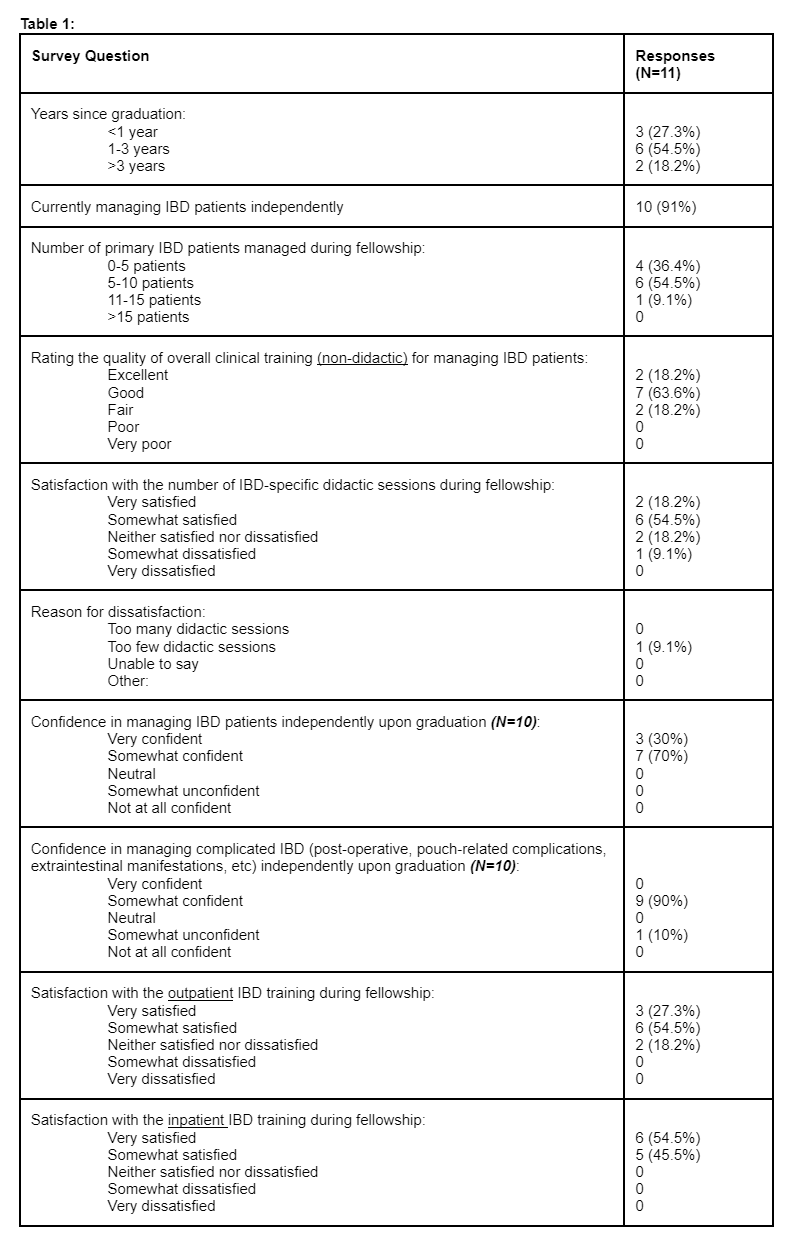Gastroenterology/Hepatology
Category: Abstract Submission
Gastroenterology/Hepatology I
9 - Let’s Talk About Inflammatory Bowel Disease: Implementation of a longitudinal dialogue-based curriculum for pediatric GI fellows
Saturday, April 23, 2022
3:30 PM - 6:00 PM US MT
Poster Number: 9
Publication Number: 9.207
Publication Number: 9.207
Joseph C. Woolley, University of Texas Southwestern Medical School, Dallas, TX, United States; Aayush Gabrani, University of Texas Southwestern Medical School, Dallas, TX, United States

Joseph C. Woolley, DO
Fellow
University of Texas Southwestern Medical School
Dallas, Texas, United States
Presenting Author(s)
Background: Exposure to inflammatory bowel disease (IBD) management during pediatric gastroenterology (GI) fellowship training is widely variable in both breadth and depth and can vary based on “institutional expertise, educational standards, personal interest, and resources to attend regional and national meetings”1. As one of the most nuanced and rapidly evolving fields in GI, it is imperative to ensure a more standardized approach to the clinical development of fellows.
Objective: We aimed to explore the perceptions of graduated fellows about their training and describe the implementation of a novel longitudinal IBD curriculum at our center influenced by their insights.
Design/Methods: A single center survey-based cross-sectional study design was used. A pre-tested survey was sent to all program graduates from the last 5 years (n=11) assessing impressions of their IBD training and subsequent confidence in independent practice. We also describe the implementation of a novel longitudinal IBD curriculum for senior fellows instituted this academic year (2021-22) and informed by survey responses.
Results: 100% (11/11) of graduates completed the survey. 91% of them managed < 10 patients with IBD in their primary outpatient clinic during fellowship training. Overall, roughly half of graduates were “somewhat satisfied” with their IBD training (Table 1 for details).Conclusion(s): Although our results show that there is some degree of satisfaction among graduates regarding IBD training, current literature supports the need for incorporating more IBD-specific curricula in fellowship training1,2,3. We have therefore introduced a longitudinal curriculum at our center to broaden the clinical management opportunities for fellows given the insufficient number of primary IBD patients followed in the outpatient setting and limited didactic sessions (4 per year on average). It consists of 1-hour long weekly sessions moderated by 2 IBD experts. Each session includes 30-60 minutes of evidence-based clinical reasoning discussions utilizing actively managed patients. Additionally, there are multidisciplinary sessions with Radiology and Surgery on a monthly and quarterly basis, respectively. A journal article is also critically reviewed monthly. We believe that this dialogue-based curriculum will significantly increase opportunity for clinical development in the management of this complex patient population and improve fellows’ confidence upon completion of their training.
Table 1 Graduated Fellow Survey Results
Graduated Fellow Survey Results
Objective: We aimed to explore the perceptions of graduated fellows about their training and describe the implementation of a novel longitudinal IBD curriculum at our center influenced by their insights.
Design/Methods: A single center survey-based cross-sectional study design was used. A pre-tested survey was sent to all program graduates from the last 5 years (n=11) assessing impressions of their IBD training and subsequent confidence in independent practice. We also describe the implementation of a novel longitudinal IBD curriculum for senior fellows instituted this academic year (2021-22) and informed by survey responses.
Results: 100% (11/11) of graduates completed the survey. 91% of them managed < 10 patients with IBD in their primary outpatient clinic during fellowship training. Overall, roughly half of graduates were “somewhat satisfied” with their IBD training (Table 1 for details).Conclusion(s): Although our results show that there is some degree of satisfaction among graduates regarding IBD training, current literature supports the need for incorporating more IBD-specific curricula in fellowship training1,2,3. We have therefore introduced a longitudinal curriculum at our center to broaden the clinical management opportunities for fellows given the insufficient number of primary IBD patients followed in the outpatient setting and limited didactic sessions (4 per year on average). It consists of 1-hour long weekly sessions moderated by 2 IBD experts. Each session includes 30-60 minutes of evidence-based clinical reasoning discussions utilizing actively managed patients. Additionally, there are multidisciplinary sessions with Radiology and Surgery on a monthly and quarterly basis, respectively. A journal article is also critically reviewed monthly. We believe that this dialogue-based curriculum will significantly increase opportunity for clinical development in the management of this complex patient population and improve fellows’ confidence upon completion of their training.
Table 1
 Graduated Fellow Survey Results
Graduated Fellow Survey Results